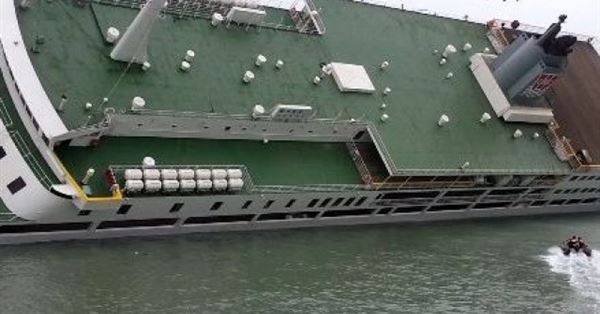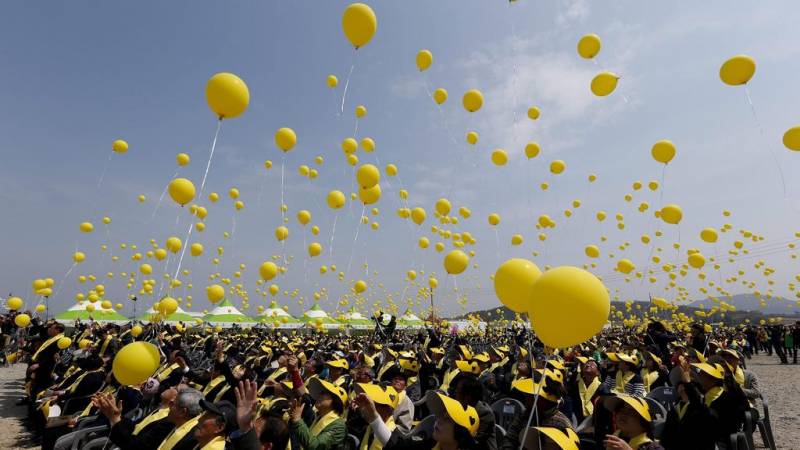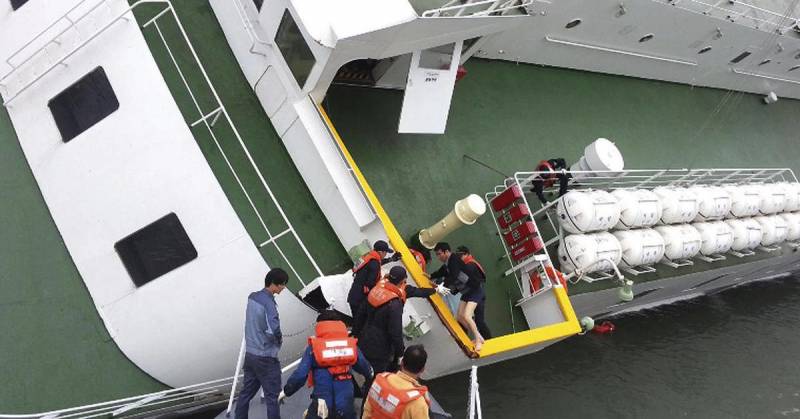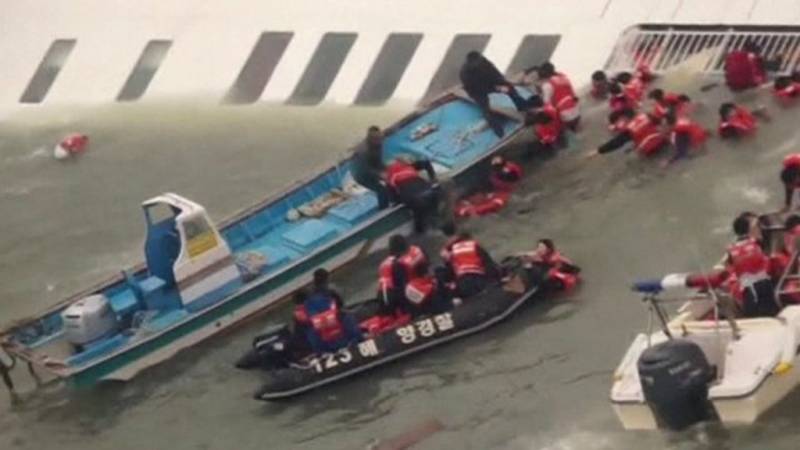Ferry "Sevol". Why didn’t the passengers save?
In the epic of the South Korean ferry "Sevol", the reasons for the wreck of which previous article was devotedThere is another very important point: why are there so many dead? 304 people is a lot. Especially considering the fact that the ferry was not sinking so far from the coast, in the area of shipping and fishing, there were trading and fishing vessels nearby. Weather conditions and the course as a whole did not impede the rescue operation. Not a storm, not a typhoon, and so many dead. Why?
As far as I can tell, in South Korea, the causes of the failure of the rescue operation were dealt with essentially as little as the causes of the phenomenal wreck of the ferry. Ultimately, all the blame was blamed on Captain Lee Zhong Sok and some other crew members. The Coast Guard investigation began in the summer of 2014, but was soon terminated and resumed only at the end of 2019, already under the new President of South Korea. Then a special investigation team was created to investigate the actions of the service, as well as to investigate the possible forgery and concealment of documents and evidence (in particular, recordings from surveillance cameras installed on the ferry). The indictment of a number of officials was brought forward in February 2020, and so far this process has not been completed. Hysteria and political interests in this case were more important than a detailed investigation of the incident.
In my opinion, this issue should be given some attention not only because of the desire to unravel the mysterious history, but also because the history of the unsuccessful rescue operation reveals quite well how South Koreans react to stressful situations, how they operate in conditions requiring personal initiative and quick wits, and how their public service responsible for guarding the maritime borders worked. After this story, I began to value much less the fighting efficiency of the South Korean army and fleet. They certainly have guns, Tanks, planes and ships, but with the ability to act in an uncertain situation, to act quickly and accurately, they have obvious problems.
Could the ship be saved?
So, at 8.40 local time on April 16, 2014, the ferry sharply tipped, its load shifted and the ship began to sink. Could something be done about it?
The first and most obvious solution: to take water into the ballast tanks on the starboard side to try to straighten the ship. This was done because the footage of the sinking ferry shows high columns of water bursting from open kingstones. Kingstones open and close from the bridge, but who exactly did this remains unknown. This could be done by Lee Zhong Suk himself or the first assistant Kang Won Sik, the person directly responsible for the loading and stability of the ship. In any case, this did not help them.
There are difficulties with the second solution. In the practice of the merchant fleet, the team usually leaves the vessel with a dangerous roll (an example was given with the Cougar Ace car carrier), and then the coast guard deals with it. The Soviet instructions on the survivability of the ship, issued by the Ministry of the Navy of the USSR, only say that the captain should try to land the ship aground and wait for the rescuers. However, Sevol did not have such an opportunity. The nearest island, Pyeon Phundo (1,7 miles to the south), was a volcanic rock and, apparently, did not have suitable shallows. In addition there was a peak of the tide. Secondly, the chief mechanic Park Ki Ho at 8.52 ordered to stop the cars and evacuate the engine room. The ship without a course, of course, could no longer get to any shallow.
It is also known that the captain in 8.52 ordered the second assistant Kim Yong Ho to start the sump pumps, to which he received the answer that the pumps did not work. At 8.54, the captain ordered the chief mechanic to go down to the engine room and start the pumps, but this order was not executed. It is difficult to say how much the pumps would help them, maybe they could win 5-10 minutes, not more: the ferries do not have a counter-flooding system. In any case, Sevol was left without pumps.
On this, the struggle for survivability was lost. Thus, even before the first signal for help, it became clear that the rescue of passengers can only be in boats.
Traces of panic
This is common sense people, in principle, ready to act in a critical situation. But, I repeat my observation of the first article, the unexpected roll and the transition of the ship into emergency condition with the inevitable prospect of flooding, became for them facts shocking and demoralizing. An incomprehensible blow, then a roll in a calm sea - this is something that cannot be.
I asked experts on the Korean mentality how South Koreans behave in a similar situation. The answer was unequivocal: stupor. This situation will bring out of balance even the seasoned “moroman,” but the South Koreans are inherently highly emotional (against ours). The third assistant, Park Han Gul, cried, which, in general, is understandable for a young woman who fell into such a binding. What did male society do on the bridge of the ferry at this time?
Here I must say that the assessment of the situation seriously depends on the sources used. The famous Korean historian Konstantin Asmolov made his description based on media reports. In my analysis, I used a different source: Kwon Y Sook's work “System Theoretic Safety Analysis of the Sewol-Ho Ferry Accident in South Korea”, which was defended in 2016 at the University of Massachusetts. This researcher clearly had access to investigative materials, which he quotes more fully than the press, for example, he names who contacted the coastal services at one time or another. It was on the basis of his data that I conducted my analysis of the actions of the team, which gave interesting results.
So, at 8.55 a distress signal was sent to the Jeju Vessel Traffic Service. The press did not indicate who filed it, but Kwon Y Sook calls the name - first assistant Kang Won Sik. Judging by the transcript of negotiations published by CNN, he said that the ship was turning over right now (which is not entirely true), asked to be connected to the coast guard, and said that the ferry was off the island of Pyeon Phundo. This is strange because they were far from Jeju, the end point of the route. At 9.07, the first assistant changed the communication channel and contacted the nearby Chindo service. Jeju's service could do little, however, contacted the coast guard at Mokpo, from where patrol ship No. 123 was immediately sent.
In my opinion, the key to understanding the situation on the bridge was radio communications. Based on the information provided by Kwon And Bitch, I made a list of those who and when conducted these negotiations:
8 hours 55 minutes: Jeju is first assistant Kang Won Sik.
9 hours 7 minutes: Jindo - First Mate Kang Won Sik.
9 hours 14 minutes: Jindo - steering Pak Kyung Nam.
9 hours 21 minutes: Jindo is the first assistant to Shin Jeong Hung.
9 hours 24 minutes: Jindo - second assistant Kim Yong Ho.
9 hours 25 minutes: Jindo - steering Pak Kyung Nam.
9 hours 26 minutes: ship No. 123 - steering Pak Kyung Nam.
9 hours 28 minutes: Jindo and ship No. 123 - Kim Yong Ho's second mate.
9 hours 37 minutes: Jindo - second assistant Kim Yong Ho.
In addition, there were calls by the ferry service in Chindo, which clarified the situation on the ferry.
On this list, the question arises: aren't too many people participating in negotiations with the coast? Typically, radio contacts are assigned to one officer so that others can deal with urgent matters. And then the microphone has two first assistants, a second assistant and another helmsman to boot. We see the microphone changing hands, almost literally.
At 9.25 a service dispatcher in Chindo informed the ferry that the captain had to make a final decision, and demanded to hurry with the decision. The dispatcher can be understood: in less than 15 minutes he managed to communicate with four different people who demanded that he save them. The dispatch of the dispatcher can only be interpreted as a polite requirement to keep order.
This situation can only be explained by the panic that swept the senior officers of the team. During this time, they did nothing to save the passengers, did not even contact the passenger deck. The passenger liaison officer, who was on the passenger deck, Kang Hae Song, in 8.52 minutes, on his own initiative, ordered the passengers to remain in their seats. He never received any orders from the bridge. His decision was clearly dictated by the fear that the movement of passengers could accelerate the roll of the vessel. Not the best solution, of course. However, he at 9.53, when the ship began to sink, at his own peril and risk, ordered the passengers to escape.
Riot on the ship
Throughout this story, it is far from clear what Captain Lee Zhong Suk did during the crash. In the press and in court hearings, emphasis was placed on the fact that he “escaped from the ferry”, although his actions, orders and words should have been given priority attention. Still, the person in charge.
The data from Kwon Y Sook, as well as the interview of the helmsman O Yong Sok (he gave several interviews with different contents), show that the captain gave orders. But they were not executed. The order to switch on the sump pumps has not been fulfilled. At 8.56, the capital ordered the second assistant Kim Yong Ho to notify passengers to wear life jackets and clothes. By itself, this order speaks of the captain's intention to begin the evacuation. The second assistant did not execute the order, because he did not turn on the warning system. At 9.27, the captain repeated his order, the second assistant handed it to the passenger deck, but did not make sure that the order was accepted, understood and executed.
But the crew did a lot without the order of the captain. This is negotiations with the shore, and two attempts to drop boats. At first, at 9.14, the helmsmen attempted Cho Joong Ki and O Yong Suk, and at 9.44, the first assistant Kang Won Sik and the steering Pak Kyung Nam. They referred to the fact that the roll was too big and they did not reach the boats (which is not entirely true).
Radio communications with the shore, in which at least four people participated, without a captain, failure to fulfill orders and perform actions without an order - what if there is no chaos on the bridge? Or, more precisely, what if not a riot on the ship, direct disobedience to the captain in a critical situation?
It is known that at the same time there were telephone conversations with the office of the shipping company Cheonhejin Heun, which owned a ferry, in which captain and first assistant Kang Won Sik participated. There were many calls, at least seven, including, as Kwon And Sook writes, the first assistant made five calls. The first was at 9.01, the last at 9.40. This caused serious questions: did they have nothing to do but this? Moreover, the content of the calls has not been published. In the light of what has been said, I think this small box opens simply: it was about who exactly commands the ship. Lee Zhong Suk reported to the office that the team did not obey him, and then the company’s office, apparently, sorted out relations with the first assistant Kang Won Sik, either demanded submission to the captain, or perhaps demanded to take control. Someday we will find out.
In general, the investigation was supposed to make a detailed reconstruction of the events, finding out who and where exactly was at each particular moment in time, what he said, to whom and what, what he was doing and what he saw. Without this, it is completely impossible to understand the degree of guilt of each crew member. But, apparently, this was not done.
My version of the background of all this is this: Lee Joon Suk was a temporary captain working on a very low-paid one-year contract, which for the 69-year-old captain, who had been at sea for about forty years, was clear evidence of his low income and social status. Most likely, he was not perceived by the permanent members of the team as a real captain. In a critical situation, a conflict arose between him and the first mate - apparently the informal leader of the ferry’s permanent team, which became the main prerequisite for the many victims. Precious time, while the ferry had not yet tilted too much and it was possible to help passengers get out, they spent on clarifying the relationship. Then it was too late, already at 9.20 the roll exceeded 50 degrees, and many passengers were blocked in their cabins. Oleg Kiryanov, who was traveling on Chevzhudo in Sevola, drew attention to the transverse corridors of passenger decks, which, when tilted and capsized, turned into inaccessible mines. Most passengers could not get out of the cabins and climb to the starboard side.
Note that it was possible to jump from the port side; it would save many lives, all other things being equal. But for this it was necessary to give an order to leave the ship no later than 9.00-9.10. Yes and later there were still chances. At this time, apparently, the conflict on the bridge reached its climax, and its participants were not up to the passengers.

Those who blame the captain for all sins should ask the question: what would you do yourself in a situation where the team does not obey you and does not obey orders?
Lie about the captain
The role of rescuers, in particular, the crew of ship No. 123 and its captain Kim Kyung Il, who was appointed the "commander of the scene", in my opinion, boiled down to the fact that they exacerbated the catastrophe that had already erupted. They initially had very weak ability to help; they did not have enough people and equipment to quickly pull out 476 passengers - this is an impossible task for 14 crew members. A patrol ship with a displacement of 100 tons could not take them all on board, and they did not have the opportunity to provide medical assistance to the victims. True, there were different ships around the sea, and service in Chindo at about 9.00 a.m. urged them to go to the aid of the ferry.
But what Kim Kyung Il did is somewhat beyond a reasonable approach. Firstly, he had no connection with the ferry (the ship approached him at 9.30, when the crew was still on board and was negotiating with Jindo), nor with the service in Jindo. Blind salvation.
Secondly, a sensible decision would be to shout into a megaphone so that passengers go out and jump overboard. Kim Kyung Il first said that a megaphone was being used. But under investigation, in August 2014, he changed his testimony and said that he panicked so much that he did not give instructions to his crew to get inside the ferry and did not order passengers to leave the ship. Surviving passenger Kim Sung Mok repeatedly stated in an interview that neither helicopters nor the ship were given instructions to leave the ship. About 40 minutes remained before the decks were immersed in the water; several dozen people could have been saved. Kang Hae Song, having heard the order from the outside, would undoubtedly have duplicated it through the on-board network.
Thirdly, Kim Kyung Il initially limited himself to sending the boat to the ferry’s bridge that had already bent to the very water and removing crew members, including captain Lee Zhong Sok.
This event gave the whole story a smack of surrealism. The captain's meeting at 9.46 was recorded on a video that was widely published. There was so much lies about this that you wonder how you can lie like that, having a documentary record. They said about the captain that he “escaped”, although in the video he without much haste goes to the boat. They also interpreted that he was supposedly “first in line,” although there was no line in frames. It was alleged that he allegedly had a life jacket, although in reality it was not. And so on and so forth.
Most importantly, it was alleged that the captain did not put on his uniform and tried to pass himself off as a passenger. The precariousness of this accusation lies in the fact that it is unlikely that the passenger will be on the bridge. Access to the bridge is limited, and it was already impossible to get there from the passenger deck with such a roll. The fact that the captain was out of shape is explained by the fact that a catastrophe found him in the cabin on vacation, and he did not have time to get dressed. Rescuers claimed that they did not know that he was a captain. But the medical officer in the port, assisting him, asked the rescuers who he was and received an answer that this was the captain of the ferry.
Finally, emotions in the Korean press lingered for a long time over the fact that the captain should be the last to leave the ship, and Lee Joon-suk escaped. This is a good marine custom, of course. However, South Korean law does not oblige the captain to remain on the ship in the event of an accident (just like the Soviet instruction for the morphlot; the captain can lead the struggle for survivability from where it is more convenient for him). Emotions were heated with the help of an amusing fake worked with scissors and glue.
I will cite the first two articles from the Korean Seafarer's Act in the original:
A captain shall not leave his / her ship from the time cargoes are loaded and passengers start to go on board until the time all cargoes are unloaded from his / her ship and all passengers leave his / her ship: Provided, that except for cases where there is a special reason that he / she should not leave his / her ship, such as abnormal weather conditions, etc., this shall not apply where he / she has appointed a person who is to perform his / her duties on his / her behalf from among officers.
Article 11
Where a ship is in critical danger, a captain shall take all the measures necessary to rescue human lives, the ship and cargoes.
And now another option - as it was quoted in the press, in particular, in the Hankuryo newspaper:
The selection reveals exactly where the Korean propagandists went with scissors, which piece they threw away and what they entered. In article 10 of the law, it is clear that we are talking about the usual conditions for sailing or parking in the port, since the captain can appoint a deputy. It was this piece that was cut out, giving the law a different meaning. Well, aren't they pretty?
Well, why all these tricks? I think in order to hide the extremely unseemly role of the coast guard and in particular the captain of ship No. 123 Kim Kyung Il. Lee Zhong Suk went on a rescue boat, of course, deliberately. Firstly, he needed a transmitter to report the situation to the shore (the ferry’s radio had already stopped working). Secondly, he probably intended to demand that the rescuers step up their actions. They had been chatting around the ferry for 15 minutes, and the rescue did not actually begin. Apparently, an unpleasant conversation took place on board between Lee Joon Suk and Kim Kyung Il. The captain of the ferry probably demanded that he approach the ship, since one rubber boat would not be enough for all passengers.
The captain of the patrol ship, of course, was afraid. The ferry is large and capsizes, and its boat is small. In general, it all ended with Kim Kyung Il just shutting up Lee Zhong Soku's mouth, using the powers of the captain of the scene given to him by the coast guard.
After about 20 minutes, at 10.18, the ferry plunged, the passengers left on it died. When the leadership of the coast guard realized what they had done, they began to compose all these entertaining stories about the "unrecognized captain" who "escaped first." To admit that Li Zhong-suk had such demands, and to admit that they did not help him in any way, meant to take responsibility for the death of more than 300 people and sit down for a long time. The aged captain of the ferry looked like an ideal “scapegoat”, it was only necessary to create a negative reputation for him, put him in prison, where he would soon die.
If on the spot Kim Kyung Il would be a strong-willed and initiative person, guided by a sense of duty and ready to take risks, he could do a lot and save a lot of people. He could level the general discord and inconsistency in the organization of the operation. But he needed to act on his own, at his own peril and risk, which Kim Kyung Il did not.
This is the story.
If we talk about the guilty, then I would put in the first place the first assistant Kang Wok Sik, apparently, the initiator of disobedience to the captain. The second place is occupied by the captain of ship No. 123 Kim Kyung Il. The ferry captain Lee Zhong Suk in this case is a victim of circumstances and they convicted him clearly unfairly.



Information